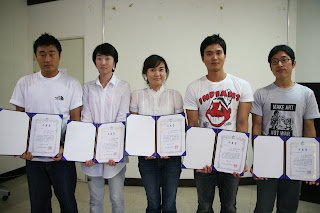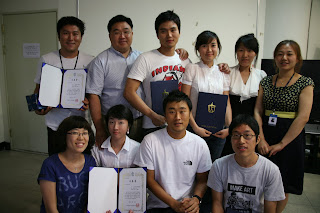The May 18 Memorial Foundation is a non-profit organization established on August 30th, 1994 by the surviving victims of the 1980 Gwangju Uprising, the victims families, and the citizens of Gwangju.
The Foundation aims to:
1. Commemorate as well as continue the spirit of struggle and solidarity of the May 18 Uprising;
2. Contribute to the peaceful reunification of Korea;
3. Work towards peace and human rights throughout the world.
Since its establishment, the Foundation has carried out numerous projects in various fields, including organizing memorial events, establishing scholarships, fostering research, disseminating information to the public, publishing relevant materials, dispensing charity and welfare benefits, building international solidarity, and awarding The Gwangju prize for Human Rights.
The Foundation opens an opportunity for students and youth to become volunteer. Twice each year they can apply to the Foundation. This is one way to introduce and continue the spirit of struggle and solidarity of the May 18 Gwangju Democratic Uprising by the student and youth as the next generation.
The volunteers were involved with the Foundation’s activities (domestic and international events), like: the Gwangju International Peace Forum, the Gwangju Prize for Human Rights, the Nanjang-Human-Free Concert, Red Festa, etc.
The Foundation also provides program for the volunteers. One of the programs is an opportunity for the volunteers to be sent abroad and work as an intern with NGO in Asia and USA. At least 10 volunteers are sent each year through a process of selection.
In 2007, the Foundation sent 5 volunteers to Asia and 7 volunteers to USA. On May 2008, intern volunteers from Asia came back to Gwangju, South Korea.
Last June 27, 2008 at 4 PM until 6.30 PM, the former intern volunteers made their presentation at the video room. They presented a situation in the country they were assigned and their work at NGO in each country; including their feelings. With their presentation, they were able to share their experiences to other volunteers and staff of the Foundation.


These are the summary from each intern volunteers:
I. Hwang Jiyeon
Through the internship program, the May 18 Memorial Foundationdispatched student volunteer to the Urban Poor Consortium (UPC),where I have worked as an intern until May, 2008. The UPC is anNGO in Indonesia that works with the urban poor and other marginalized groups and international volunteers to solve Indonesian urban povertyproblems. To defend the rights of the urban poor, it aims to developstrong people's organizations and networks, through which they canreclaim their right to live healthy and safely as human beings in theCity of Jakarta.The goal of UPC is grassroots empowerment through advocacy,organizing and networking. The grassroots organizing programs isdivided into alternative health care, children's learning and savingthrough garbage recycling. There are 32 communities managed by the UPCin Jakarta. I would like to be of help to children in the urban poorcommunities and work with the members of children's learning groups. Iusually visited the children's learning groups in 19 poor communitiesin Jakarta and participated in weekly meetings in the communities withteachers from each children's learning group. I started toinvestigate child abuse problems in poor families. I hope my researchdata could be adopted to improve children's condition in urban poorfamilies.
II. Chohee

Chohee’s presentation was divided into 3 parts, which were:
1. What is Forum-Asia. This part told about the organization.
2. As an Intern at the Forum-Asia and Earthright International for 8 months.
3. Other activities in Thailand.Chohee shared all her experiences in Thailand.
She was happy because she could share with other people.
III. Kim Yo An

Yoan was an intern at EMPOWER, Malaysia. Yoan’s presentation was divided into 2 parts, which were:
1. General introduction Malaysia and specific human rights situation of Malaysia.
2. Local NGOs dealing with those specific human rights situation.
As an intern, Yoan helped the creation of EMPOWER’s website and other works.
IV. Kang Donghun

Nepal has been setting up the peace process since the agreement on the cease-fire of civil war between government and Maoists. Moreover, it decided to demolish old monarchy and to become a democratic republican country after the Constituent assembly election. People in Nepal, however, are still suffering various types of human rights violations such as bomb explosion, beating, human trafficking, abduction, murder and displacement, etc.Due to Maoists’ winning on the Constituent assembly election; they have been accused of violating human rights for the last 10 years, the international communities are concerned with their human rights records.INSEC has been working for the establishment of peace and stable political condition in Nepal as an advisory organization for 20 years and mostly concentrated on the election during my internship, in 2007 and 2008.I had been assigned for CAAFAG (Children Affiliated with Armed Forces and Armed Groups) at first. I participated in many group meetings and was trained in some programs relating to the issue. Moreover, I was sent to some districts to interview human rights activists and children and to contingents of Maoists in Dang.The other main affair was working as an international observer for the Constituent assembly election. Since the release of the code of conduct for the election, I and interns in INSEC have monitored and researched on the election. Once I was dispatched to Rolpa, the original place of Maoist, for a fact-finding mission when two cadres of Maoists were murdered by unidentified group.



For this year, the Foundation sent 11 volunteer abroad. As the next generation, the volunteer have responsibility for keep and always commemorate the history of the May 18 Gwangju Democratic Uprising. They must understand what is happening in Asia and relate it with the ideas of May 18 Gwangju Democratic Uprising.
Intern volunteers from USA (7 people) will come on August 2008 and they will also make their presentation.
link:

 Every year the Foundation opens an opportunity for Gwangju citizens who have interest in photography and the May 18 Gwangju Democratic Uprising. The program is ‘The May Citizen Documentary Photographer Academy’.
Every year the Foundation opens an opportunity for Gwangju citizens who have interest in photography and the May 18 Gwangju Democratic Uprising. The program is ‘The May Citizen Documentary Photographer Academy’. 



 The aim of this program is to keep the spirit, struggle, and bravery of the professional photographers who took pictures during the May 18 Gwangju Democratic Uprising. In that time, it was a difficult for them to take pictures, but they could made memories with their pictures that people can see and learn until now. They made the May 18 Gwangju Democratic Uprising refer to as post history of Gwangju in other cities and countries.
The aim of this program is to keep the spirit, struggle, and bravery of the professional photographers who took pictures during the May 18 Gwangju Democratic Uprising. In that time, it was a difficult for them to take pictures, but they could made memories with their pictures that people can see and learn until now. They made the May 18 Gwangju Democratic Uprising refer to as post history of Gwangju in other cities and countries.
 On his speech, as a representative of the class/students, Mr. Choi Jeong Hwan said thank you for the May 18 Memorial Foundation, their teacher include Mr. Park Cheung as a coordinator of this program.
On his speech, as a representative of the class/students, Mr. Choi Jeong Hwan said thank you for the May 18 Memorial Foundation, their teacher include Mr. Park Cheung as a coordinator of this program.



















































